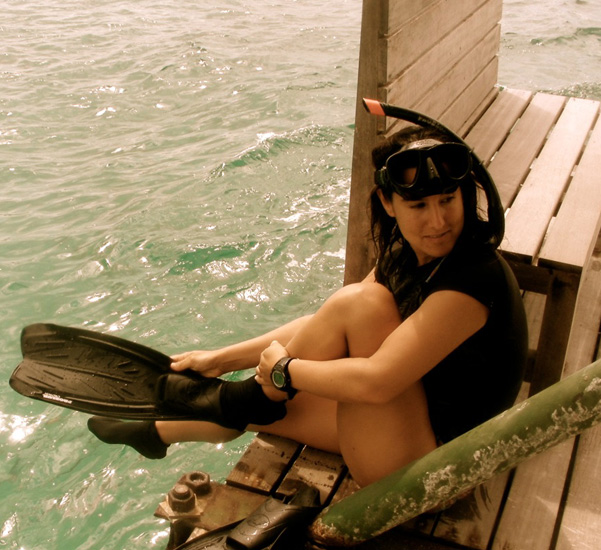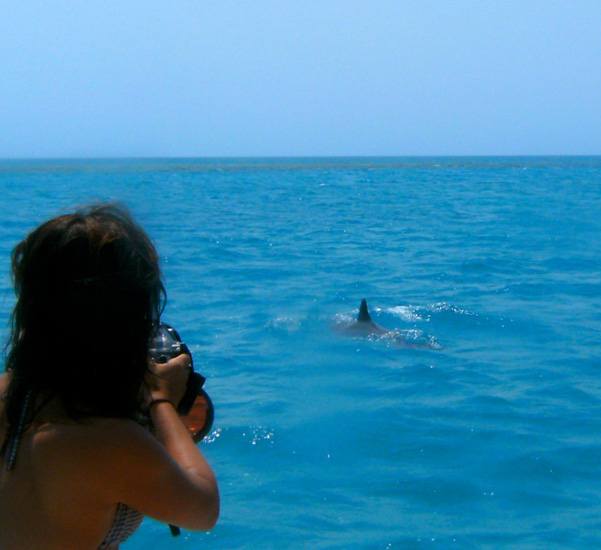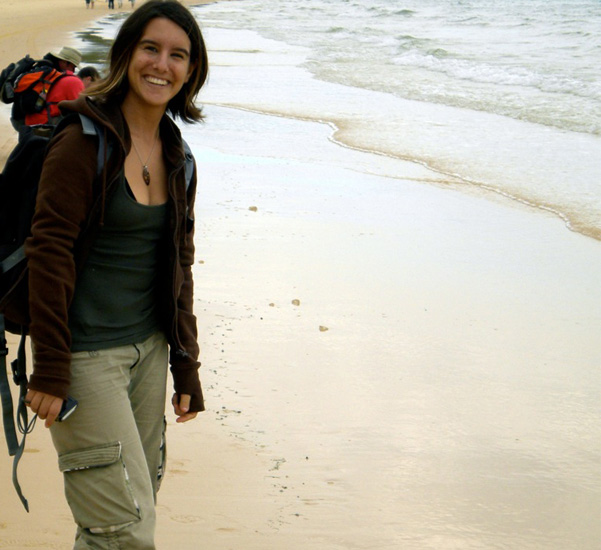 |
| Renata gets ready for a snorkel in a pontoon in Nusa Lembongen, Indonesia. |
What was the hardest aspect of working towards your Ph.D.?
Being patient was the hardest for me, especially when it comes to publishing your work. Learning that the publication process takes months, and sometimes years, was the most difficult for me. I am used to making things happen, and when all your hard work sits on someone’s (i.e. the editors) desk for months it is hard to be patient about it.
What's been the most rewarding aspect of your Ph.D. studies?
Can I say everything? The 15 months of fieldwork on an offshore coral atoll were very rewarding (and exhausting), but so was disentangling the patterns in my data after hundreds of hours of data analysis, sharing what I learnt with peers and submitting my thesis. I could never choose between these aspects. In short, my answer is the entire ride.
Doing a Ph.D. felt like going on a three-year bike ride, it was fun, challenging and an unforgettable experience that took me around the world (from Europe, to the Caribbean and from there to Australia). My Ph.D. ride had a particular long climb in the last months. Finishing my thesis felt like riding up a very long and steep hill, where you can’t see the top but you simply know you have to keep pushing the pedals. As the deadline approached I would first see the top of the hill, still quite far away and as I pedaled further it became clear that it wasn’t really that far. It took the best in me to keep pedaling and I had to give myself entirely to make it to the finish line.
 |
| Morning tea break: being a marine biologists has its rewards. Renata films a pod of dolphins during a surface interval. |
What professional-oriented advice would you offer an aspiring conservation biologist who wants to pursue a career in marine science?
As M. Gandhi famously said “You may never know what results come of your action, but if you do nothing there will be no result." It is not an easy path, conservation, often filled with frustrations and big challenges, but if your heart is in it and you don’t give up, you will most likely love it. So don’t be afraid and get out there.
If you could change one thing about your professional development up to this point what would it be and why?
I would have attended more classes/workshops when I was an undergraduate and mingled more with my professors and more senior conservationists and academics. I did attend to most classes and had a great relationship with my professors, but now I realize I could have benefited if I had been more involved.
Conservation biology is a competitive field in that many of the jobs are grant-dependent or with government agencies that are always under the austerity gun. What do you think is key to long-term professional success in the field?
I would like to know the answer to that question myself. In my (little) experience collaboration, passion and perseverance are key to professional success in this field.
 |
|
Renata at Moreton Island, Australia. ----------------------------------------------------------------------------------------------------------------------------------------------------------------------------------------- |
Fast forward to the end of your career – to retirement. When you look back, what do you want to be able to say about your career?
That I contributed significantly to the conservation and better understanding of marine ecosystems.
Final question: What is the biggest marine conservation challenge that you see on a global scale?
At a global scale I believe the biggest challenge for marine conservation is to teach people that they can make a difference, in their every day choices, to influence some of the biggest threats to marine ecosystems such as overfishing and global warming. These are global problems, but their solutions are local. Only if the majority of us join forces to minimize greenhouse gasses and consume only sustainable seafood will these threats be overcome. I recently wrote an article in The Conversation regarding sustainable seafood, please follow this link if you want to read it.
| Page: | 1 | | | 2 |